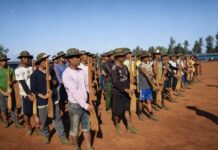Many could now relax with a deep sigh, as the Union Peace-making Work Committee (UPWC) and Ethnic Armed Organizations’ (EAOs) Senior Delegation (SD) have decided that the peace talks should continue, regardless of the regime’s earlier hard stance circulated by the Myanmar Peace Center (MPC) MPC over the EAOs newly formed team and its 12 points amendment resolution, made at Law Khee Lah, during the 2 to 9 summit meeting.
Earlier, on 3 July, U Aung Min said that the regime wasn’t keen to amend the Nationwide Ceasefire Agreement (NCA) draft and stand fast against any amendment, but changed tone, the following day and accepted that the EAOs’ Law Khee Lah resolution to be discussed in further negotiation process.
According to DVB of 5 July, U Aung Min, the regime’s top peace negotiator told the media at the end of the meeting, in Chiangmai: “The meeting today is successful. We were able to open one side of the door, to sign the NCA. But in between we still need to discuss. Senior Delegation (SD) will be invited to Yangon for discussion. It could be said that a step has been overcome.”
Likewise, his counterpart, Deputy leader of ethnic delegation Pu Zing Cung said the discussion of Law Khee Lah resolution will continue, which could be divided into four sections.
“If we look at Law Khee Lah resolution, we could divide it into four parts. One is to smoothen the wordings and introduction; other parts are the defining of meanings, issues that could be tackled with government’s meeting decision, and issues that could be inserted into the draft after discussion. In it, there is almost nothing much, concerning the part of insertion after discussion, except for one or two things. It looks like all need another negotiation process.”
Also in Mizzima 4 July report, Pu Zing Cung said: “Today’s decision is constructive and could be taken as a successful meeting. It could be termed that both sides were determined and of the opinion to pull through until the peace process is achieved.”
It is good that the UPWC has taken a more pragmatic stand, brushing aside its earlier reluctant position of not to consider the Law Khee Lah’s amendment on preliminary NCA draft agreed of 31 March, and also not to meet the EAOs’ SD, as negotiation partner.
According to the recent Burma Centre for Ethnic Studies analysis, the unwise move of MPC and UPWC is criticized as below:
“ For instance, it is quite unhealthy for the NCA process when some of government representatives rush into criticizing the leadership of EAOs for the collective decisions that they have made during their own summit. Rather than deliberating their strategic responses, some officials from the government side have spent their precious time questioning the legitimacy and mandate of the new EAO Senior Delegation and their collective decisions during the summit. It is not up to outsiders, nor the government, to decide who should represent the EAOs in the ongoing peace negotiations. EAOs can do anything they want politically as they are independent by all accounts.”
Critics have pointed out the EAOs’ omitting of the phrase “according to the existing law” and “reintegration” from original “security reintegration” will be hard for the military to accept. Besides, if the military rejection of recent constitutional amendments, which were aimed to correct the military veto power in the parliament, stemming from its appointed 25% MP seats, the same rejection could be the result, regarding amendment of the NCA draft. For amendment of some articles, particularly where diluting the military veto voting power is concerned, needs 75% MPs’ votes to sail through the first motion of the amendment proposal.
Whatever the case, the decision that regime and SD have chosen to further talk to each other, negotiate and keep the peace process running is a pragmatic move and in the right direction. However, it is crucial to keep in mind that all the gains made at the negotiation table and nurtured trust could be washed away in no time, if the Commander-in-Chief Min Aung Hlaing would continue to dole out statements that the EAOs need to tread the path of surrender, in order to reach a nationwide political settlement. He has repeatedly aired such opinion on various occasions, which amounts to intentionally, torpedoing of peace process.
And as such, the success or failure of the meeting between the UPWC and SD will depend on how much good will and accommodation the military is willing to make, when the negotiating partners gather again within the third week of this month.
The contributor is ex-General Secretary of the dormant Shan Democratic Union (SDU) — Editor












Leave a Comments